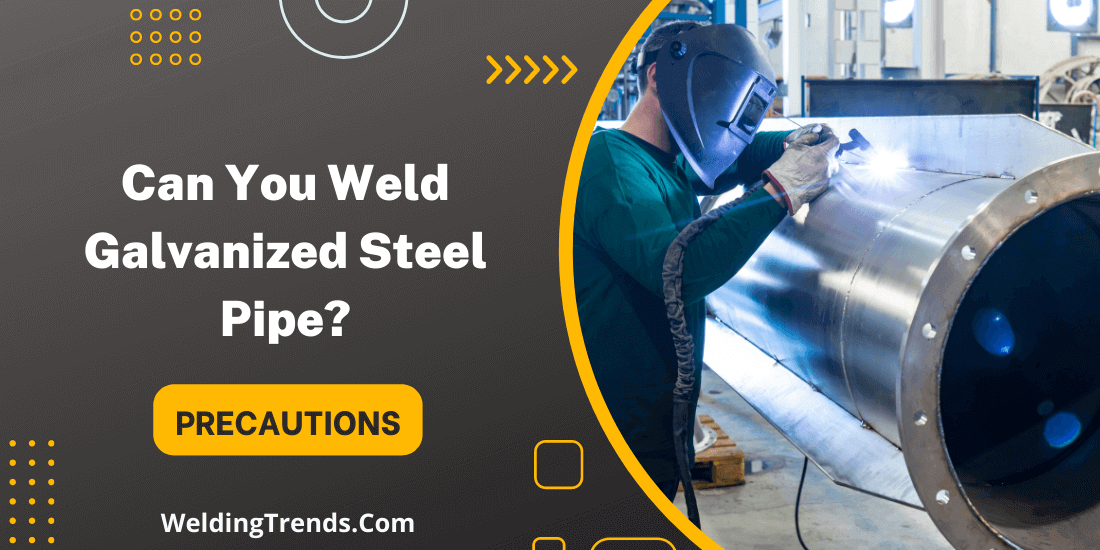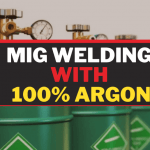Galvanized steel pipe is a type of piping that is used in many industries. It is made of steel that has been coated with zinc, which protects the metal from corrosion. Galvanized steel pipe is strong and durable, making it a popular choice for many applications.
A galvanized steel pipe is used in many applications because of its corrosion resistance. It is important to know if you can weld galvanized steel pipe before starting a project, as there are specific welding procedures that must be followed.
In this blog post, we will discuss the basics of welding galvanized steel pipes and provide some tips for success.
Can You Weld Galvanized Steel Pipe?
Galvanized steel pipe can be welded, but it will be more difficult than welding uncoated steel pipe. Galvanized coating increases the hardness of the steel and makes it more difficult to create a good weld.
In addition, galvanized coating can flake off when heated during welding, which can create welding problems. For these reasons, it is generally not recommended to weld galvanized steel pipe. If you must weld galvanized steel pipe, take care to avoid creating any welds that could cause problems.
Precautions for Welding Galvanized Steel Pipe
- Use the correct welding rod- E7018 low hydrogen electrode is recommended.
- Use clean, dry shielding gas- Argon is recommended.
- Clean the galvanized surface before welding- use a wire brush to remove any loose galvanize and scale.
- Weld in short intervals- no more than 4 inches at a time. This will help prevent the build-up of heat, which can cause problems with the weld.
- Do not over weld- this can cause problems with the weld and the galvanized coating.
- Inspect the welds after welding- look for any signs of problems, such as cracks or voids in the weld bead. If you see any problems, re-weld the area.
- Test the welds before putting them into service- use a hydrostatic pressure test to check for leaks.
Welding galvanized steel pipe is not an easy task. There are several things that you need to be aware of to do it properly. By following the tips above, you can help ensure that your welds are strong and will not cause any problems.
Advantages of welding galvanized steel pipe?
There are many advantages to welding galvanized steel pipes. Some of these advantages include:
- Galvanized steel pipe is strong and durable.
- It is resistant to corrosion.
- This steel pipe is easy to weld.
- Galvanized steel pipe is readily available.
- Galvanized steel pipe is a versatile material that can be used in many different applications.
- It can be recycled easily.
- These pipes have a long lifespan.
- Galvanized steel pipes are cost-effective.
- They offer a sleek and professional appearance.
- These steel pipes are environmentally friendly.
- Welding galvanized steel pipes is a relatively simple process.
- Many different types of welding equipment can be used to weld galvanized steel pipes.
- They are available in many different sizes.
- It can be cut to any length desired.
- Galvanized steel pipe can be threaded to create custom fittings
Disadvantages of welding galvanized steel pipe?
- Zinc coating on galvanized steel pipe can sometimes make the pipe difficult to weld.
- If not done properly, welding galvanized steel pipe can release harmful fumes into the air.
- Welding galvanized steel pipe requires special procedures and equipment.
- Galvanized steel pipe is not always readily available in all sizes.
- Galvanized steel pipe can be more expensive than other types of steel pipe.
Projects that use welded galvanized steel pipe?
Many different projects use welded galvanized steel pipes. Some of these projects include:
- Pipelines
- Boilers
- Pressure vessels
- Sheds
- Fences
- Gates
Welding galvanized steel pipe is a necessary process for many different projects. By following the tips above, you can help ensure a successful weld.
FAQs – Weld Galvanized Steel Pipe
What happens when you weld galvanized steel?
When you weld galvanized steel, the zinc coating on the steel melts and evaporates. This releases harmful fumes into the air.
The fumes can contain lead, cadmium, and other toxins. exposure to these fumes can cause metal fume fever, respiratory problems, and other health problems.
Is it safe to weld a galvanized pipe?
Yes, it is safe to weld galvanized pipe. However, you must take proper safety precautions and use the right type of welding equipment, you can easily weld a galvanized pipe.
Should I drink milk after welding galvanized?
Yes, you should drink milk after welding galvanized. Milk helps to neutralize the toxins in your body that are released when you weld galvanized steel.
Can you use regular welding rods on galvanized steel?
No, you cannot use regular welding rods on galvanized steel. Regular welding rods will not work with galvanized steel. You must use a 7018 welding rod or another type of welding rod that is made specifically for welding galvanized steel.
Why is galvanized steel poisonous?
Galvanized steel is poisonous because it contains lead, cadmium, and other toxins. Exposure to these toxins can cause metal fume fever, respiratory problems, and other health problems.
Can galvanized steel make you sick?
Yes, galvanized steel can make you sick. Exposure to the fumes released when welding galvanized steel can cause metal fume fever, respiratory problems, and other health problems.
Wrap Up
So, the answer to the question is yes – you can weld galvanized steel pipe. However, you must take a few precautions to make sure your welding process goes as smoothly as possible. Make sure you have all of the necessary safety gear and equipment, and always follow best practices when welding galvanized steel pipes.
Finally, it is important to keep in mind that Galvanizing produces fumes that contain Zinc Oxide (ZnO). Zinc oxide is an irritant and can cause respiratory problems if breathed in over a long period of time. Make sure you wear a respirator whenever working with galvanizing fumes.
With a little preparation and caution, you should be able to weld galvanized steel like a pro!




